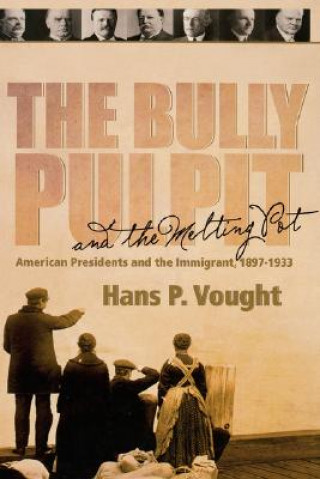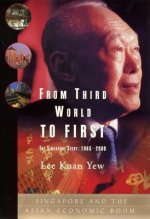
Kód: 02797814
Bully Pulpit and the Melting
Autor Hans P. Vought
Between 1897 and 1933 the presidents of the United States joined progressive reformers in redefining the concept of the United States as a "melting pot." Their use of this metaphor to describe assimilation never meant that immigra ... celý popis
- Jazyk:
 Angličtina
Angličtina - Väzba: Pevná
- Počet strán: 280
Nakladateľ: Mercer University Press, 2004
- Viac informácií o knihe

53.59 €
Dostupnosť:
50 % šanca Máme informáciu, že by titul mohol byť dostupný. Na základe vašej objednávky sa ho pokúsime do 6 týždňov zabezpečiť.
Máme informáciu, že by titul mohol byť dostupný. Na základe vašej objednávky sa ho pokúsime do 6 týždňov zabezpečiť.Prehľadáme celý svet
Mohlo by sa vám tiež páčiť
-

Young Explorers 2 Sun, Cloud, Stone
5.33 € -2 % -

Solubility of Gases and Liquids
71.04 € -

Taxation of Corporations and Shareholders
71.04 € -

My Little Sister Doris
9.03 € -13 % -

RV Living Full Time
9.74 € -

Transformative and Engaging Leadership
71.04 € -

Helgolandfahrt
21.96 €
Darčekový poukaz: Radosť zaručená
- Darujte poukaz v ľubovoľnej hodnote, a my sa postaráme o zvyšok.
- Poukaz sa vzťahuje na všetky produkty v našej ponuke.
- Elektronický poukaz si vytlačíte z e-mailu a môžete ho ihneď darovať.
- Platnosť poukazu je 12 mesiacov od dátumu vystavenia.
Informovať o naskladnení knihy
Zadajte do formulára e-mailovú adresu a akonáhle knihu naskladníme, zašleme vám o tom správu. Postrážime všetko za vás.
Viac informácií o knihe Bully Pulpit and the Melting
Nákupom získate 132 bodov
 Anotácia knihy
Anotácia knihy
Between 1897 and 1933 the presidents of the United States joined progressive reformers in redefining the concept of the United States as a "melting pot." Their use of this metaphor to describe assimilation never meant that immigrants had to completely abandon their ethnic cultures. Instead, they argued that the "melting pot" blended the best of the immigrants" traits and traditions to create a new American "race" united by patriotism and committed to liberal political and economic ideals. While nativists regarded "new" immigrants from southern and eastern Europe as incapable of assimilation, the presidents celebrated immigrant contributions to America and emphasized the need to improve immigrants' lives through education, resettlement away from urban ghettoes, and economic uplift. The president's speeches, letters, and administrative records reveal consistent support for the "melting pot" model as an alternative to nativist racism. While McKinley, Roosevelt, Taft and Wilson supported the exclusion of racial aliens and those with mental or physical illness, they repeatedly praised the "new" immigrants for embracing American ideals while maintaining their ethnic cultures. They argued that everyone should be judged by their moral character rather than their ancestry. World War I raised fears of disloyal aliens that Roosevelt and Wilson heightened by denouncing "hyphenated Americans." Harding, Coolidge, and Hoover continued to use "melting pot" rhetoric, however, rather than endorsing coercive assimilation. The "melting pot" legacy lives on, and still offers a middle ground between the demands for national unity and multiculturalism.
 Parametre knihy
Parametre knihy
Zaradenie knihy Knihy po anglicky Humanities History Regional & national history
53.59 €
- Celý názov: Bully Pulpit and the Melting
- Autor: Hans P. Vought
- Jazyk:
 Angličtina
Angličtina - Väzba: Pevná
- Počet strán: 280
- EAN: 9780865548879
- ISBN: 9780865548879
- ID: 02797814
- Nakladateľ: Mercer University Press
- Hmotnosť: 558 g
- Rozmery: 236 × 164 × 27 mm
- Dátum vydania: 01. December 2004
Obľúbené z iného súdka
-

Hundred Years' War on Palestine
12.11 € -24 % -

Decline and Fall of the Roman Empire
5.95 € -21 % -

Citizens
22.07 € -23 % -

Strange Death of Europe
16.62 € -23 % -

Londoners
11.28 € -25 % -

History of Japan
16.52 € -18 % -

Secret History
12.31 € -23 % -

Ninja, The Secret History of Ninjutsu
15.39 € -16 % -

In The Garden of Beasts
12.21 € -21 % -

Polish Saber
63.03 € -

Wages of Destruction
22.07 € -23 % -

From Third World to First
31.92 € -23 % -

Introduction to the History of the Principal Kingdoms & States of Europe
17.24 € -

Covering Islam
17.44 € -5 % -

Voices of the Foreign Legion
17.44 € -5 % -

Maurice's Strategikon
30.69 € -2 % -

Becoming Indian
39.73 € -

Napoleon's Master
24.94 € -13 % -

Blind Mans Bluff
12.31 € -23 % -

Penguin Historical Atlas of Ancient Egypt
18.57 € -21 % -

Life on the Mississippi
12.31 € -20 % -

Middle Byzantine Historians
215.20 € -

Thirteenth Tribe
16.93 € -

Anatomy of the Nuremberg Trials
17.65 € -3 % -

Modern France: A Very Short Introduction
9.44 € -34 % -

Twilight of the Romanovs
38.29 € -23 % -

Ethnic Cleansing of Palestine
14.47 € -23 % -

Ten Myths About Israel
13.65 € -14 % -

Palestine
20.32 € -20 % -

Giza Power Plant
16.11 € -16 % -

The Secret Diaries Of Miss Anne Lister: Vol. 1
13.65 € -14 % -

The Balkans, 1804-2012
22.07 € -23 % -

Age Of Revolution
16.62 € -23 % -

The Thirteenth Tribe
12.72 € -

Millennium
13.24 € -22 % -

Alexiad
17.86 € -20 % -

Heraclius, Emperor of Byzantium
33.46 € -18 % -

1948
24.74 € -10 % -

Annals of Imperial Rome
14.47 € -23 % -

Women Who Shaped Politics
24.94 € -13 % -

Strike and Hold
30.07 € -3 % -

Diana: Her True Story - In Her Own Words
11.08 € -23 % -

How to be a Victorian
14.47 € -23 % -

The Oxford History of Ancient Egypt
15.49 € -23 % -

Line in the Sand
11.80 € -6 % -

Rise And Fall Of The Third Reich
22.07 € -23 % -

Illustrated Encyclopedia of Uniforms of the American War of Independence
22.07 € -23 % -

Olympic, Titanic, Britannic
30.38 € -15 % -

Medieval Monsters
11.18 € -23 %
Osobný odber Bratislava a 2642 dalších
Copyright ©2008-24 najlacnejsie-knihy.sk Všetky práva vyhradenéSúkromieCookies


 21 miliónov titulov
21 miliónov titulov Vrátenie do mesiaca
Vrátenie do mesiaca 02/210 210 99 (8-15.30h)
02/210 210 99 (8-15.30h)